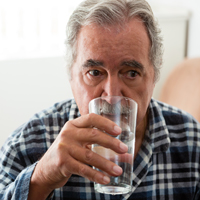The Importance of Staying Hydrated in the Summer Especially as we Age
June 27, 2018 As we age, our bodies become more affected by the heat, as well as less able to regulate it. When someone drinks too little water they can become dehydrated, which can result in heat exhaustion or even heat stroke. In order to fight against dehydration it is important to know what its common signs are. Some of the most typical signs of dehydration often include dry mouth, lack of sweating, low blood pressure, delirium, rapid breathing, irritability or confusion, sunken eyes and thirst.
As we age, our bodies become more affected by the heat, as well as less able to regulate it. When someone drinks too little water they can become dehydrated, which can result in heat exhaustion or even heat stroke. In order to fight against dehydration it is important to know what its common signs are. Some of the most typical signs of dehydration often include dry mouth, lack of sweating, low blood pressure, delirium, rapid breathing, irritability or confusion, sunken eyes and thirst.
According to the Office of Disease Prevention and Health Promotion (ODPHP), caregivers can help older people to avoid becoming dehydrated – which is especially important in the summertime. As a result of poor hydration, older people are at a greater risk for developing medical complications like kidney stones, constipation, mental confusion, falls, bladder infections as well as oral diseases.
According to the ODPHP, many older people may intentionally avoid drinking fluids due to being incontinent and wanting to avoid having an accident. Other common causes of dehydration in older adults include a lost sense of thirst, forgetting to drink enough water, struggling to stay hydrated due to pain from moving around, taking medications that make it difficult to hold fluids in or being more vulnerable to dehydration. If a person is in the advanced stages of dementia, they may struggle to swallow fluids.
If a person is diabetic, they may urinate more frequently and therefore be more at risk for becoming dehydrated. According to the Centers for Disease Control and Prevention (CDC), nearly 26% of people in the U.S. who have diabetes are older than 65. People who are over 65 and diabetic are at an especially high risk for dehydration and all of its associated medical complications.
Here are some tips especially for caregivers aiming to lower rates of dehydration in seniors:
- Instruct senior patients/residents to always carry a bottle of water;
- Recommend exercising indoors to beat the heat;
- Urge drinking water even if the person struggles to feel thirsty;
- Monitor fluid intake;
- Serve flavored waters, fruit-infused water or a combination of juice and water if someone refuses to drink it plain;
- Urge consuming water-heavy foods, such as cucumbers and tomatoes, and:
- Serve savory broths to increase fluid intake
Seniors residing in nursing homes are at a particularly high risk for dehydration due to substandard care or neglect. Nursing homes are legally responsible for providing residents with care as well as providing a safe environment, but can be run poorly and in ways that are dangerous for residents. In a study published in the American Journal of Nursing, as many as 31% of participating residents in long-term care facilities were found to be dehydrated. In a Nursing Home Abuse Guide study, dehydration was cited as one of the most common forms of elder care abuse to occur in facilities. The CDC estimates that at least 1.5 million people live in nursing homes across the U.S., so it is especially important that caregivers in these settings ensure that their patients consume enough fluids to avoid the deadly effects of dehydration.
Generally speaking, it is recommended that adults consume at least 64 ounces – or 8 cups – of water every day. In certain cases, doctors may recommend that seniors drink more water depending on what medications they are taking. If a person is sweating or urinating more frequently, they should probably be drinking more water. However, if you have any questions about how much water you or your loved ones should be drinking, consult directly with a healthcare professional.
Please be careful to drink enough water especially if you are a senior, diabetic, or are taking certain medications or have a preexisting condition that can increase the likelihood of dehydration. If you are a caregiver for geriatric patients, please remember to monitor and encourage a healthy fluid intake, as well as to report any concerns about substandard nursing home care or other types of neglect to our firm.
Philadelphia Personal Injury Lawyers at Galfand Berger, LLP Representing Injured Victims Since 1947
If you have questions, please contact our Philadelphia personal injury lawyers. Galfand Berger has offices located in Philadelphia, Bethlehem, Lancaster, and Reading and we serve clients throughout Pennsylvania and New Jersey. To schedule a consultation, call us at 800-222-8792 or complete our online contact form.
 Google Screened
Google Screened
